Literacy is the cornerstone of education, and its foundations are laid in the early years of a child’s life. For preschoolers, literacy is not just about reading and writing; it encompasses a broad range of activities that stimulate language development, cognitive skills, and creativity.
In this blog post, we will explore various literacy activities tailored for preschoolers, designed to foster a love for reading and learning.
We get commissions for purchases made through links in this post. As an Amazon Associate, we earn from qualifying purchases.
What are literacy skills?
Literacy skills are the capabilities that enable individuals to read, write, speak, and listen effectively. These skills are fundamental for communication, learning, and accessing information in everyday life.
Pre-Literacy Skills for Preschoolers
Literacy activities for preschoolers encompass much more than just letter identification or reading practice. Children can begin developing what we call pre-literacy skills.
Pre-literacy skills are the foundation upon which children build their ability to read and write. For preschoolers, developing these skills is less about formal education and more about engaging in enjoyable and engaging activities.
Here are some essential pre-literacy skills for preschoolers:
- Oral language development
- Understanding and using spoken language.
- Participating in conversations.
- Listening and responding to stories and information.
- Phonological awareness
- Recognizing and playing with the sounds in words, such as rhyming and alliteration.
- Identifying syllables and beginning sounds in words.
- Print awareness
- Understanding that print carries meaning.
- Recognizing print in the environment (like signs and labels).
- Knowing how to handle a book and understanding that text is read from left to right and top to bottom.
- Letter knowledge
- Recognizing letter shapes and names.
- Understanding that letters have specific sounds associated with them.
- Vocabulary development
- Learning and using a wide variety of words.
- Understanding word meanings and concepts.
- Narrative skills
- Telling stories and describing events in a logical sequence.
- Understanding and retelling stories.
- Fine motor skills
- Developing the hand-eye coordination and control needed for writing.
- Engaging in activities like drawing, cutting, and writing to strengthen the muscles in the hands and fingers.
- Motivation to read/love of books
- Showing interest in books and reading.
- Choosing to look at books and participate in reading activities.
By integrating these pre-literacy skills into the daily lives of preschoolers through playful and engaging activities, we can set them on the path to becoming confident readers and writers.
21 Literacy Activities for Preschoolers
1. Interactive Read-Alouds
Take time to read with kids every day!
This is a time for you to bond with your child and build positive associations with books and reading, print awareness, vocabulary, and narrative skills.
Check out all my favorite Montessori books and bear books for kids!
Reading Tips:
- Let kids pick the book. It might be the same one again and again, but that’s okay! Repetition is how they learn.
- Call attention to text. Point to the title. Use your finger to follow along with the text while reading aloud to show how we read from left to right.
- Introduce book-related vocabulary. Talk about the book’s cover, title, author, illustrator, and spine. There is no need to quiz kids; simply use these words yourself.
- Encourage interaction. Pause and ask kids to predict what might happen next or ask open-ended questions about the story as it relates to them. Take time to talk about the illustrations. Invite kids to turn the pages.
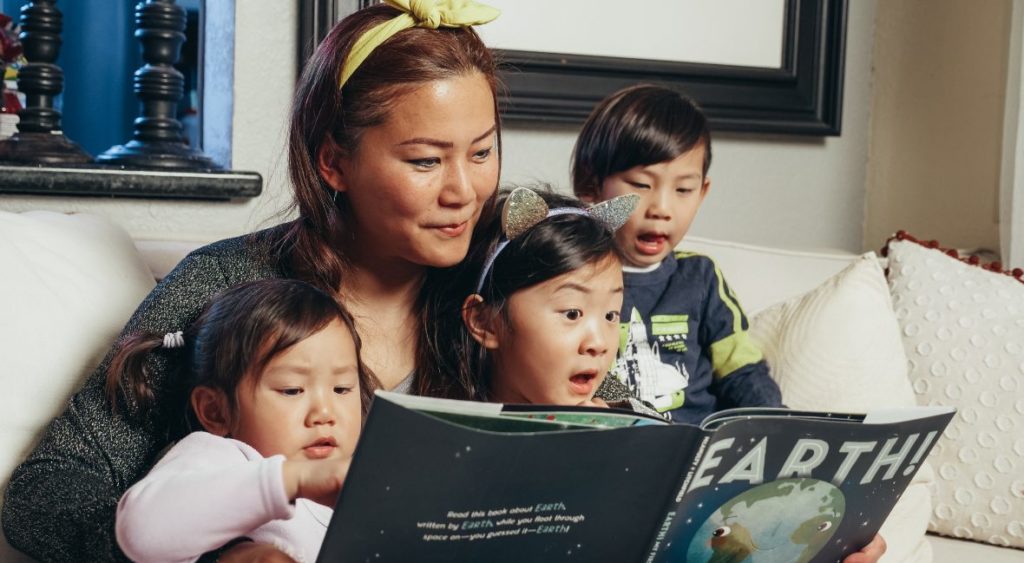
2. Collaborative Storytelling
Spend time telling stories with kids. This builds their narrative and oral language skills and is lots of fun!
Here are 3 easy ways to tell stories:
- Back and forth: You can start a story with a sentence, and then you and your child can further the story by adding sentences.
- Seven-sentence story: This format prompts kids and helps them learn about story structure. It can be fun to write these stories down and allow kids to illustrate them.
- “Once upon a time, there was a …”
- “And every day…”
- “Until one day…”
- “And because of this…”
- “And because of that…”
- “Until finally…”
- “And ever since that day…”
- Story Dice: Story dice are a fun way for kids to tell a story. Kids roll the dice to generate a sequence of pictures and then narrate a unique story that connects the images. The stories are often hilarious and nonsensical. You can introduce the dice by modeling the telling the first story.
3. Rhyme Time
Engage children in rhyming games and songs that highlight the sounds of words. This helps them recognize phonemic patterns, an essential skill for reading.
Rhyming Activities:
- Nursery rhymes. Favorites include:
- Hey Diddle Diddle
- One, Two, Buckle My Shoe
- Twinkle Twinkle Little Star
- Hickory Dickory Dock
- Humpty Dumpty
- Rhyming books. Preschool favorites include Hop on Pop and Ten Apples Up on Top.
- Rhyming puzzles. These are great for practicing rhyming, matching, and new vocabulary.
4. Words/Letter Walk
Head out for a family walk and have kids point out all the letters and words they can find. Finding small “hidden” text and BIG text can be fun. Stay the names of the letters and read, read the words, and talk about what they tell us.
For example, “I see those letters too! That sign says S-T-O-P stop. It tells cars to stop and wait their turn.”
This helps to build kids’ oral language skills, print awareness, letter knowledge, and phonological awareness!
5. Family Reading Time
Want kids to love reading? Model reading! Reading in front of your kids shows them that you like books too.
Set aside time several times a week (or even every day!) when everyone reads their own book. This works even for kids who have not learned to read yet. They can simply pick a stack of books and practice turning the pages and looking at the illustrations.
Creating a cozy reading nook as the go-to place for family reading time can be fun. Kids might even love picking out their own special reading pillow.
6. Mark Making
Before kids begin writing, they need lots of practice mark making (aka drawing and coloring).
Give kids access to art supplies such as crayons, markers, brushes and paints. This will help them develop the muscles and coordination (fine motor skills) and focus needed to eventually write.
- Sticker crafts for kids can be another great way to develop fine motor skills!
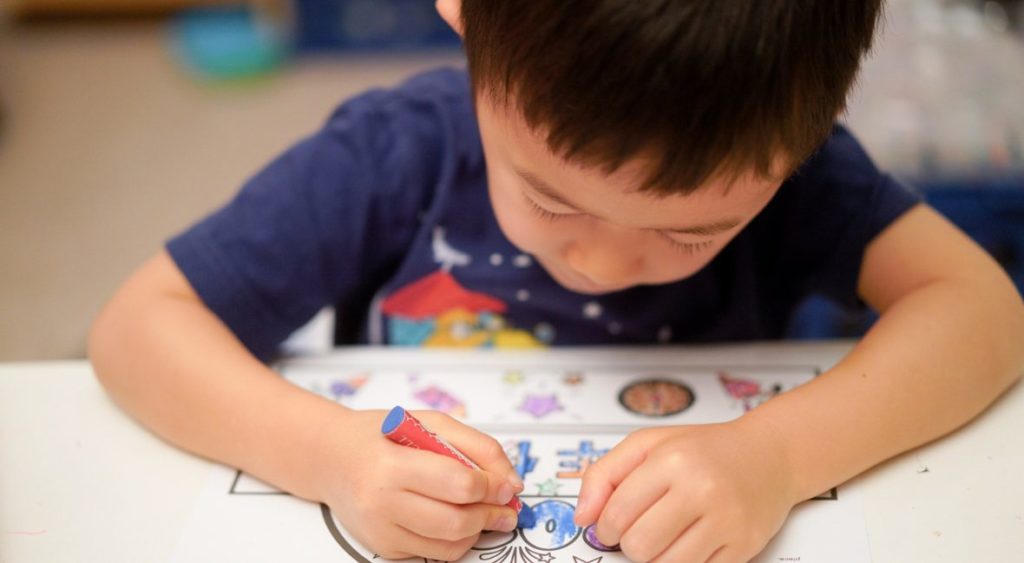
7. Park Time
Did you know playing outside is great for developing pre-literacy skills?
Running, jumping, climbing, etc., help children develop the gross motor and fine motor skills needed to sit in a chair and control a pencil.
For example, climbing is essential for developing the hand strength to sustain writing. Running and jumping build the core muscles needed to support a child as they sit in a chair.
So let kids play knowing you are giving them the skills they need for later literacy success!
8. Word Wall
Create a word wall with new vocabulary words encountered in books or daily activities. Use pictures and words to make it visually appealing and accessible. Kids can help write or illustrate the words.
This builds kids’ vocabulary, print awareness, and emergent reading skills.
9. Journaling
Introduce simple journaling activities where kids can draw or write about their day. This can include a combination of scribbling, drawing, and attempting to write letters or words.
Kids love getting to pick and decorate their very own journals.
This can be a fun activity for the whole family to do together and an excellent way for you to model reflection.
10. Playdough
Playdough is an excellent activity for building the hand muscles needed for writing, making it a fun and essential literacy activity for preschoolers!
It encourages children to roll, squeeze, pinch, and flatten, strengthening the fine motor skills and hand-eye coordination essential for holding and maneuvering a pencil. These repetitive motions help develop the muscle endurance and dexterity critical for writing tasks.
Here is my favorite play dough recipe for Lisa Murphy. (Psst, following the playdough recipe can be another excellent literacy activity!)
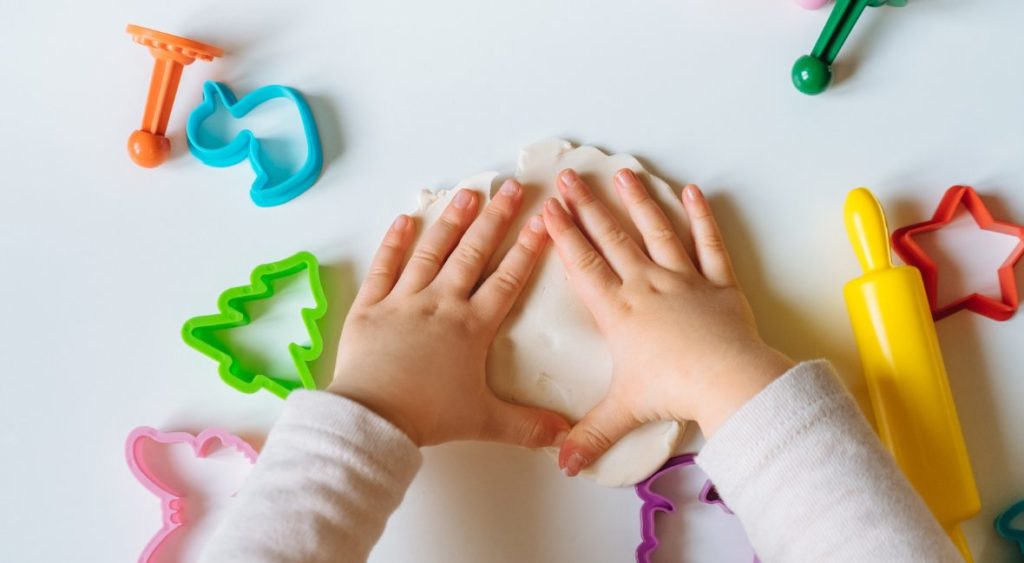
11. Alphabet Hunt
There are two ways you can play alphabet hunt!
First, begin by simply writing down the ABCs on a piece of paper and head out on a walk or drive. Here are two games:
- Begin looking for letters starting with the letter A. You can practice spotting both upper case and lower case letters, read the word, and discuss whether the letter is at the beginning, middle, or end of the word.
- Begin looking for something that starts with the letter A and work through the alphabet as you find things. Use the paper to easily see what letter comes next.
12. Yoto Player Read-Along
Pair a physical copy of a book with an audiobook and have kids practice following along. This is great for growing their love of books, print awareness, and narrative and vocabulary skills.
A Yoto player can be a fantastic, screen-free way for kids to pick and play audiobooks independently.
13. Baking
Baking can be a fun and valuable literacy activity as it involves following written recipes. This helps kids develop print awareness and vocabulary skills. Kids don’t need to be able to read you to help you find the next step and see you referencing the text!
It also introduces them to instructional language and sequence words like first, next, then, and last, enhancing their understanding of process and order, which is critical for reading and writing development.
Have kids help you brainstorm things they want to make and pick recipes together.

14. Shopping Lists
Involve kids in creating a shopping list before heading to the store. They can help brainstorm the necessary things and practice writing or illustrating the various items.
You can do this activity with kids even before they write. Simply talking about the words you are writing draws attention to the text and helps kids begin to understand that text has meaning.
15. Would You Rather…
To play “Would You Rather,” present two scenarios and have the child choose one, explaining why they made that choice.
This game builds pre-literacy skills by enhancing decision-making, critical thinking, and verbal expression as kids articulate their preferences and reasoning.
16. Syllable Game
You and your kids can practice clapping out syllables in names or everyday objects to help them break down words into smaller sound units and build their phonological awareness.
Once kids have the hang of it, you can take turns giving each other words to clap out.
Kids find this game surprisingly engaging!
17. Twenty Questions
This simple game is a kid favorite!
In “20 Questions,” one player thinks of an object, and the others ask up to 20 yes-or-no questions to guess what it is. That’s it! You can use prewritten questions or come up with your own.
Playing this game enhances literacy skills by promoting critical thinking, question formulation, and vocabulary development as kids learn to ask specific questions and use language effectively to narrow down the possibilities.
18. Library Visit
Visiting the library is a fantastic way to give kids access to lots of text and promote a love of reading and books. Make visits part of your weekly routine.
Top library tips:
- Get kids their own library card. This makes kids feel extra special and grown up.
- Get each kid their own book bag. A bag can help kids develop responsibility by allowing them to carry their own books. Kids can return their books to their library bag the night before heading to the library. This makes it easy to get everything returned each week.
- Limit the number of books each kid can check out. I like to limit the number of books so that kids can carry and keep track of all of them. Knowing that each child has 3 books checked out can make it easy to track them all down and return them on time.
19. Sand Tray Writing
Simply put some sand in a shallow box or tray and let kids make designs with their fingers or paintbrushes.
You can add ABC flashcards for your child to copy if they are showing an interest in letters.
This helps kids build their letter knowledge and fine motor skills.
20. ABC Bingo
ABC Bingo is a fun game that helps children recognize and learn the letters of the alphabet.
This activity builds literacy skills by reinforcing letter recognition, phonemic awareness, and listening skills, as children must identify and match the spoken letter with its visual representation on their bingo cards.
I find it helpful to hold up the letter card as you call it out so that kids can easily find a match on their own bingo board. For larger groups, I like to write the letter on a small whiteboard to show kids.
Protip: let kids take turns being the caller!
21. White Glue Collage
Squeezing a glue bottle is a simple yet effective activity for building the fine motor skills necessary for literacy, mainly writing. Also, kids love squeezing out as much glue as they want and are often engaged for long periods!
Get out an assortment of small items and scraps of paper and let kids glue away!
Final Thoughts
Literacy activities for preschoolers should be diverse, engaging, and integrated into their daily routines. By providing a variety of experiences, we can cultivate a love for reading and learning that will serve as a solid foundation for their educational journey.
Remember, the goal is not just to teach literacy skills but to inspire a lifelong passion for exploration and discovery through words and stories.

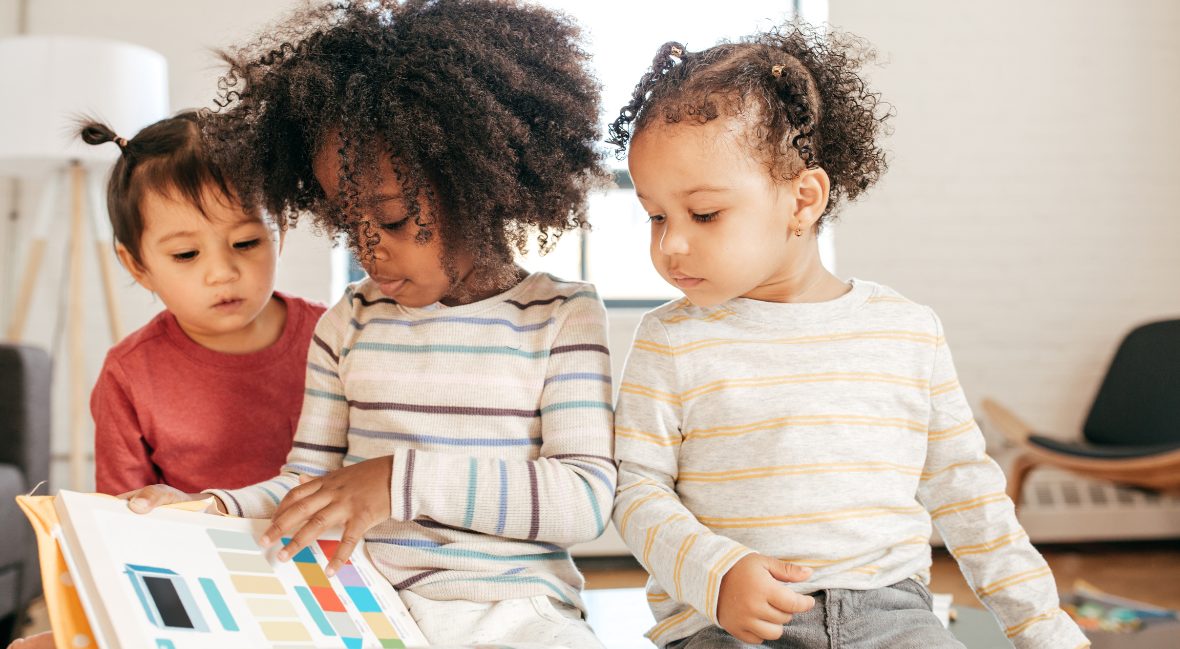



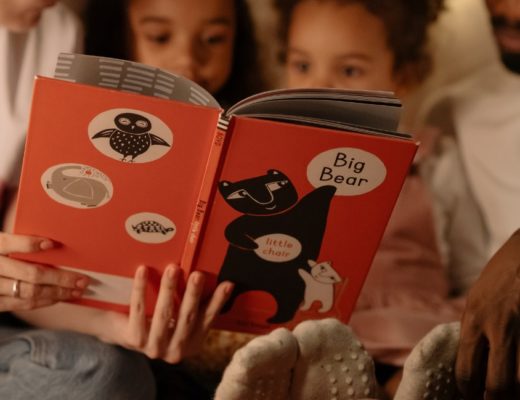
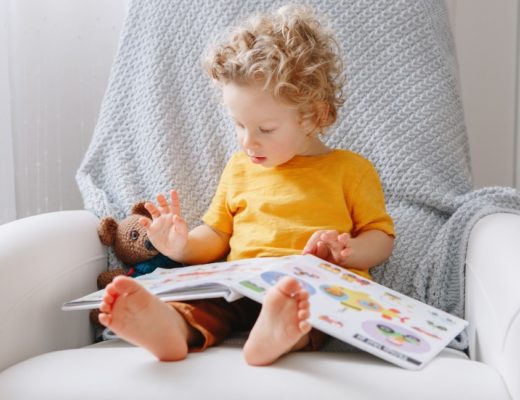

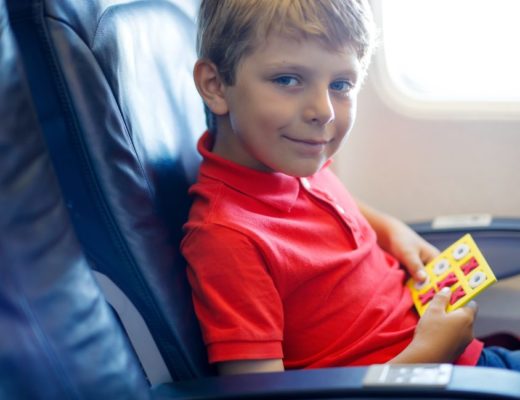
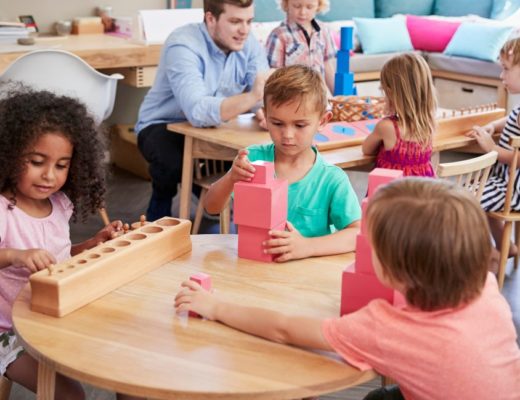
No Comments